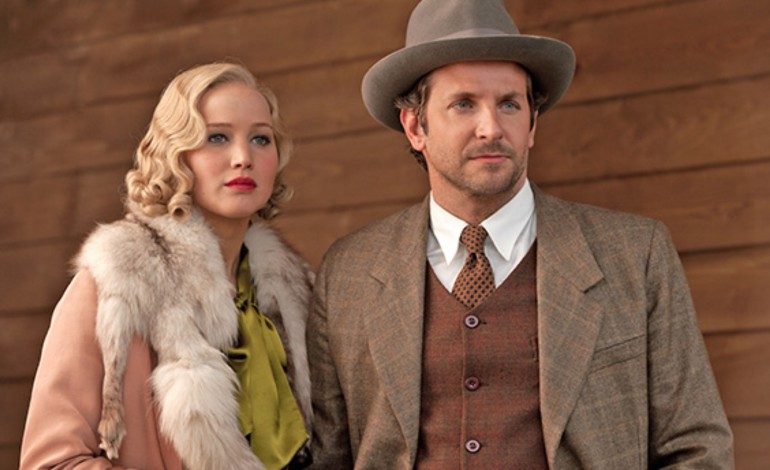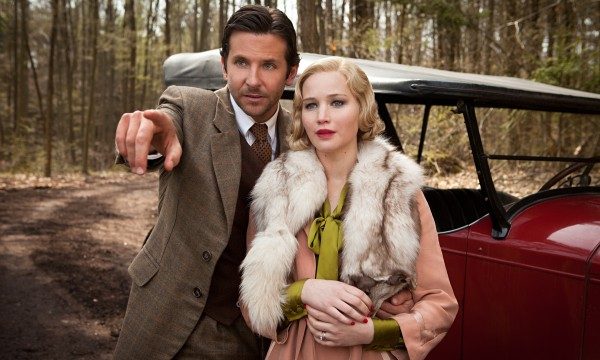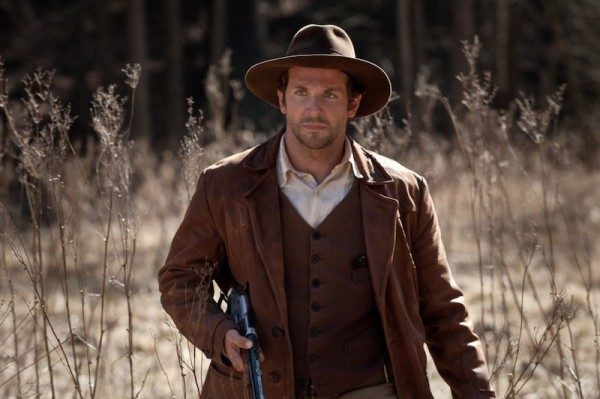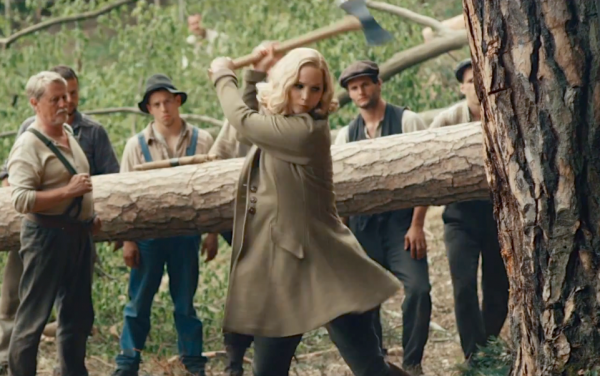

There’s a memorable scene in the film Whiplash in which a hardened conservatory conductor asks his prodigious young drum student, “Were you rushing or dragging?” A similar question probably should have been asked in the editing room for Suzanne Bier’s arbitrarily paced Shakespearean soap opera Serena, a “new” film starring Bradley Cooper and Jennifer Lawrence. “New” is quotes because the film was shot back in early 2012 shortly after the duo completed filming the Oscar-winning hit Silver Linings Playbook and right around the same time the first Hunger Games film was blasting Lawrence to the movie star stratosphere. Since then Cooper and Lawrence reunited for 2013’s American Hustle, and Cooper’s star as risen to new levels thanks the gargantuan success of American Sniper.
On paper, Serena couldn’t have hit at a better time. Yet it’s probably best for the careers of both Cooper and Lawrence if few fans actually venture out to see it. Neither actor is terrible, per se, but the but the stuffy period rigidity of Serena plays to the natural strengths of neither performer. Cooper and especially Lawrence look and act as movie stars playing dress-up. The story itself – that of a tumultuous romance in a Depression-era timber hub in the Smokey Mountains – doesn’t do them many favors, at least as rendered by Bier (the Oscar-winning foreign film In a Better World) and written by Christopher Kyle (Alexander). It looks pretty, but it’s awfully chilly, and in truth a bit of a mess – think an undercooked Cold Mountain with a haphazard dash of Macbeth sprinkled on top and you have a general taste for Serena.
Cooper plays George Pemberton, a social climber in the timber and logging business. While a rather unethical business – in the first reel we learn of Pemberton’s dangerous working conditions and his crooked bookkeeping – he’s also a bit of a dreamer and a spin artist. George’s “lost in the clouds” outlook and hollow sense of hubris may be what attracts Serena (Lawrence) to him – their first meeting on horseback finds George stating, “I think we should be married.” The line seems to be meant ironically since Serena isn’t a romantic fairy tale thematically and could almost read as parody of one as a whole; however, the text and filmmaking make it unclear whether it’s intended as a joke or not.
Following a brief happy-as-clams montage, the pair become partners in marriage as well as business, and Serena proves quite adept at helping to build George’s budding timber empire. This invites the ire of George’s business colleague Buchanan (David Dencik), who is suspicious of Serena and her interest in such unwomanly things. Serena’s “I can do anything better than you” confidence at the start of the picture warms nearly everyone else though, particularly a sinister ex-con named Galloway (Rhys Ifans). Serena’s pluck and sense of agency – the only part of the character where Lawrence can really shine – as a strong businesswoman in rural late 1920s America would probably make for a strong movie by itself, but, like romance, that’s not really the story here.
Instead, Serena dithers in the twisty, Machiavellian ways George and Serena try to get to the top of the timber world and into the social elite of a country still reeling from the stock market crash. Setting a fairly lethargic pace early on, the film switches gears with twist after twist that eventually start to unravel both George and (particularly) Serena. Serena occupies a strange narrative flow that pits the married couple against one another in lurid ways – so much so that Serena can almost be read as a stiffly refined period version of Gone Girl. The snap is that the filmmaking is so earnest and filled to gills with prestige-soaked refinement, including Morten Soborg’s sumptuous cinematography and Signe Sejlund’s beautiful costumes, that it doesn’t really feel like the filmmakers are acutely aware of the type of movie that they’re making.
Serena was adapted from Ron Rash’s novel, and it may indeed be a very fine book. The shifts in tone and in the motivations of the characters might have more time to coalesce on either an intellectual or an emotional level on the page. George’s everyman sensibilities and the cunning tease of Serena’s character show potential, but Bier and Kyle chose a style which renders stretches of the film as, frankly, a bit silly. For instance, George is obsessed with hunting a phantom panther is surely meant as some sort of symbolic grace note, but prompts unintended laughs.
What the film truly needed was bold stylist to dissect the plot and get beneath the surface its messy characters and screwy narrative. At one point Black Swan director Darren Aronofsky and Angelina Jolie were in talks to make Serena, and that seems likes a step in the right direction. Bier is too tentative to really go all in, which especially encumbers the performers. Cooper is stripped of his charisma but fares slightly better than Lawrence, who is left adrift right when Serena, as a character, should be the focal point. Simply said, the Oscar-winning actress is much too young for the part of a manipulative schemer, all cunning and guile, and much too modern a performer to be effective in the period setting.
The Verdict: 1 out of 5
Beautiful production values aside, the long-delayed Serena is a pretty dreadful film where everything from tone, to character development, to acting performances seems completely out-of-sync. On one hand, director Suzanne Bier appears to be making a refined romantic fable; yet, the twisty, convoluted story inside that fable reads nearly as a parody of the same, an irony may not have totally understood. Bier and team could be accused of both “rushing” and “dragging” as the movie dithers about for long stretches in futile attempts to capture mood, while many of the movie’s twisty reveals ensconced within its labyrinthine plot are left hanging without much purpose.



